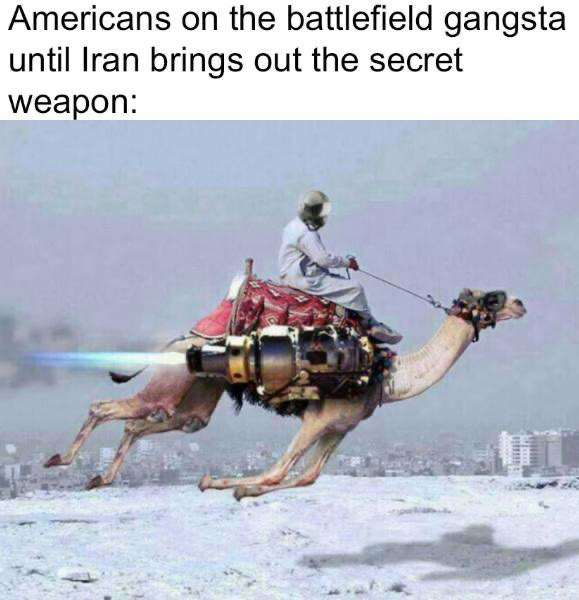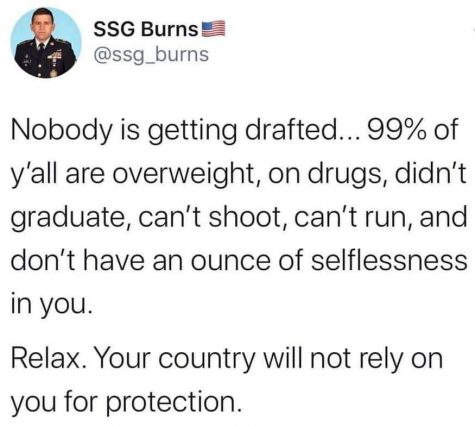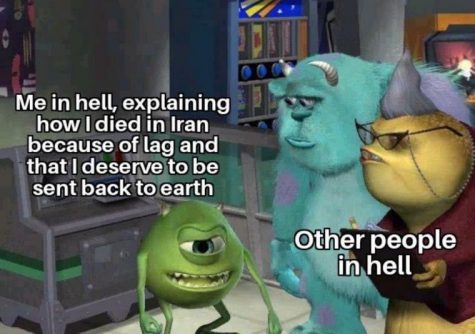World War 3 becomes a meme
How the influx of WWIII memes affects MVHS students’ and teachers’ views on world events

Used with permission from Parssa Alimadad
January 10, 2020
Junior Parssa Alimadad’s vision of what a war with Iran would entail is unlike what some people would imagine. The image to the right — a man covered in vaguely Middle Eastern robes, riding a camel propelled by rocket boosters — is captioned: “Americans on the battlefield gangsta until Iran brings out the secret weapon.” With common knowledge, Iran most likely does not possess flying camels in its arsenal, but this is only one of the plethora of memes that have been created around the recent developments between the U.S. and Iran labeled by the internet as World War 3.
According to the Oxford Dictionary, a world war is a conflict in which “all or most of the principal nations of the world” engage in. Following WWI and WWII, the idea of a third global conflict has been commonly mentioned in close calls like the Korean War or Cuban Missile Crisis. With the U.S. claiming responsibility for Iranian general Qasem Soleimani’s death, the idea of a third world war has exploded through comedic memes on social media platforms like TikTok, Twitter and Instagram.
Some memes play on people’s fear of the possibility of a draft; one reads “When they start recruiting men for WWIII” and displays a male teacher wearing a wig, making a visibly crude attempt to appear as a woman.

Another responds to the fear surrounding the possible draft, calling out the current generation for their faults.

Many memes have also featured video game jargon; one shows Mike Wazowski from “Monsters, Inc.” talking to Sully and Roz and is captioned “Me in hell, explaining how I died in Iran because of lag and that I deserve to be sent back to earth.” Countless similar memes connect a possible war with popular combat video games with buzzwords like “lag,” a common annoyance among gamers when slow internet speeds cause them to fall behind in fast-paced shooter games.

While memes might appear unique to the current generation, according to junior Nelson Mu, humor is and has been a natural social response that people have turned to in the face of change throughout history. For example, Mu says that various late night talk hosts in the 20th century have joked about changes in a similar manner.
“One of the main informants in, for example, Watergate, was [named] ‘Deep Throat’ — of course his voice was deep and whatever, but that was just taken straight from a pornographic film,” Mu said. “You can even look back at the [American Revolution] — people made political cartoons about that. I think that WW3 memes and video edits and [image macros] are just a new iteration of what people have been doing for recorded history, essentially. People have been making jokes as a way to do hot takes on political current events for as long as humanity has existed.”
Senior Raghav Gupta agrees that humor is not a new response to the possibility of war. He says the ideas behind political cartoons from previous eras are almost identical to those of memes today.
“Every generation and every war has had some kind of response with texts and images like cartoons from the Vietnam War,” Gupta said. “This is Generation Z’s version of political cartoons, and if you’ve seen a lot of the historical ones, they do bear a lot of resemblance to memes. The medium is just new because we have technology like the internet where we can create images with text.”
Although Gupta believes the idea of serious topics having a humorous spin doesn’t seem to be a new phenomenon with the current youth generation, history teacher Ben Recktenwald does believe that political memes are new.
“Well, memes are a new thing, so I think it would absolutely be a generational thing,” Recktenwald said. “The question is will [they] continue in the future? Maybe the next generation behind you guys might be like, ‘Memes are old school, now we do programmed headaches.’”
Though some perceive this comedy as taken too far, Mu believes there are benefits to the meme influx. Because memes represent simple ideas and are easily shared, Mu says that they help more people become aware of global conflicts.
“Information is not sacred,” Mu said. “As long as information gets out, it’s useful. People can get the wrong idea from [memes] — they might assume WW3 actually exists because people are making jokes about it, but at the end of the day, the majority of memes are pretty factually correct … and even if you’re not learning the specifics, like who was killed, what happened exactly, where did he get killed, people still get this understanding that there is a conflict.”
In addition, Recktenwald believes that a humorous spin on current events allows people to express their opinions without being overwhelmed with sadness. He also believes that comedy can bring people together in these situations and raise awareness.
“Humor is also a great way to just bring attention to an issue,” Recktenwald said. “If you have somebody who’s really good at crafting a joke, whether it’s a comedian or a meme, it can really bring a quick and easy understanding of an issue that perhaps a more dry, traditional and upfront explanation of an issue might not.”
However, Recktenwald does believe that these WWIII memes and social movements on the Internet are not an adequate replacement for actually physically going out and protesting.
“There’s a ton of people who interpret taking action online like signing a petition online or posting a Facebook thing or whatever, and they’re not inherently bad, but they’re no substitute for actually getting out in the street and yelling and protesting and making a ruckus and actually being heard,” Recktenwald said. “When’s the last time you heard the news go, ‘Yes, and here’s this hot meme about WWIII,’ versus ‘There were 10,000 people on the street protesting today?’”
While memes can potentially circulate false ideas, Mu doesn’t see inherent risks in people looking at memes. Mu is confident that most people end up doing research and understanding the hard facts after becoming aware of important topics through memes.
“If you’re getting your news specifically only from reaction images of cats freaking the s— out about WW3, you got something wrong with you,” Mu said. “You need to do more research if you’re going to try to understand this better. I feel like people understand the difference between a single airstrike against a terrorist target and WW3. And obviously there’s people that are going to take memes way too seriously, but that’s the minority.”
Gupta believes that one reason why WW3 memes have gained popularity is because they play off of a collective fear for a prolonged war.
“Generation Z doesn’t want to go to war for who we see is an unpopular president — it’s a war that our generation perceives as unjustified and they fear it,” Gupta said. “Calling it a world war is overblown, but that’s part of the satirical point because a war with U.S. and Iran wouldn’t be a world war … it will probably be another conflict the U.S. will get into, another ‘forever war’ that Generation Z fears having to go to, just like Afghanistan and Iraq. It’s basically geopolitical poop hitting the fan.”
Alimadad ultimately sees a full-scale war between the U.S. and Iran as an unlikely outcome in the near future.
“In our society, I don’t think we’re really inclined to go into a war,” Alimadad said. “Even if Iran does do something, I think the U.S. will have to see something extremely serious for it to escalate to a war, but for now, it’s all fun and games in my opinion.”


















